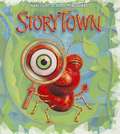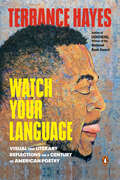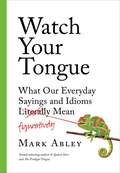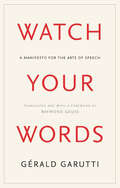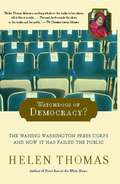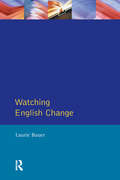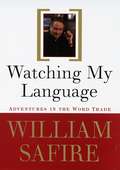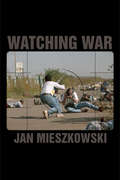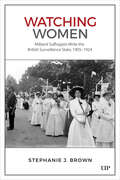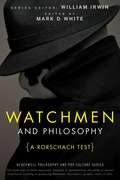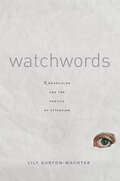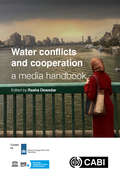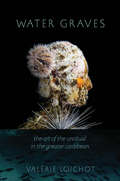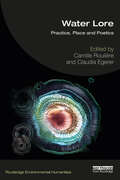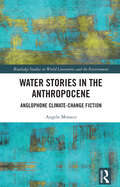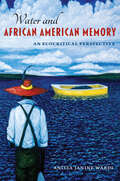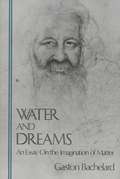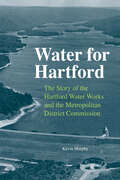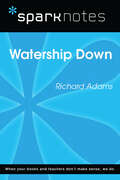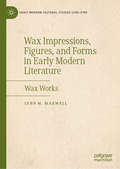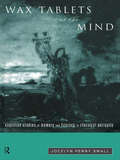- Table View
- List View
Watch Your Language: Visual and Literary Reflections on a Century of American Poetry
by Terrance HayesFrom the National Book Award–winning author of Lighthead, Terrance Hayes, a fascinating collection of graphic reviews and illustrated prose addressing the last century of American poetry—to be published simultaneously with his latest poetry collection, So to SpeakCanonized, overlooked, and forgotten African American poets star in Terrance Hayes's brilliant contemplations of personal, canonical, and allegorical literary development. Proceeding from Toni Morrison's aim to expand the landscape of literary imagination in Playing in the Dark ("I want to draw a map, so to speak, of a critical geography"), Watch Your Language charts a lyrical geography of reading and influence in poetry. Illustrated micro-essays, graphic book reviews, biographical prose poems, and nonfiction sketches make reading an imaginative and critical act of watching your language. Hayes has made a kind of poetic guidebook with more questions than answers. "If you don't see suffering's potential as art, will it remain suffering?" he asks in one of the lively mock poetry exam questions of this musing, mercurial collection. Hayes's astonishing drawings and essays literally and figuratively map the acclaimed poet's routes, roots, and wanderings through the landscape of contemporary poetry.
Watch Your Tongue: What Our Everyday Sayings and Idioms Figuratively Mean
by Mark AbleyPhrases, idioms, and clichés—why do we say the things we say? Watch Your Tongue explores weird and wonderful everyday sayings and what they reveal about us.Do you ever wonder why you shouldn’t have a cow but you should seize a bull by its horns? Who has the better reputation in language—cats or dogs? Do you sometimes feel that our speech is all smoke and mirrors or that our expressions simply make no sense? In Watch Your Tongue, award-winning author Mark Abley explores the phrases, idioms, and clichés of our everyday language. With wit and subtle wisdom, he unravels the mysteries of these expressions, illuminating the history, tradition and stories behind everything we say. Pulling examples from Shakespeare’s plays to sports team names, ancient Rome to Twitter, Abley shares samples and anecdotes of the eccentric ways that we play with, parse, and pattern language. Why do so many companies use fruit for their brand names? What do politicians mean when they say they’re going to “drain the swamp”? Why does English use chickens to signify cowardice? Abley dives into the history and psychology behind these examples and countless others, unpacking their significance (and sheer absurdity) to show how our language developed, where it is headed, and what we can learn about ourselves from it. Whimsically illustrated, easily browsable, and full of catchy sidebars, Watch Your Tongue celebrates how we amuse ourselves with words and what our sayings reveal about the way we see the world.
Watch Your Words: A Manifesto for the Arts of Speech
by Gerald GaruttiNever before has humanity done so much talking... But is anyone listening? For that matter, are people ever speaking to each other?We need to acknowledge that speech, as we know it, has never been so debased. We live in a world full of empty, degraded, and potentially violent speech: a daily reality that confronts us in the workplace, in the media, on the streets, on the internet and in our political lives. Verbal clashes are commonplace, while proper dialogue is rare.Gérald Garutti pushes for a return to a more constructive and responsible form of speech. He lays the groundwork for a humanistic approach: one which, contrary to the dominant culture of ignoring and humiliating others, emphasizes listening to them and mastering speech as a way of connecting. The arts of speech can contribute to the reconciliation of tensions in our society and to the realization of our full humanity.Watch Your Words is a stunning manifesto for anyone interested in how we might better communicate with each other.
Watchdogs of Democracy?
by Helen ThomasIn the course of more than sixty years spent covering Washington politics, Helen Thomas has witnessed a raft of fundamental changes in the way news is gathered and reported. Gone are the days of frequent firsthand contact with the president. Now, the press sees the president only at tightly controlled and orchestrated press conferences. In addition, Thomas sees a growing -- and alarming -- reluctance among reporters to question government spokesmen and probe for the truth. The result has been a wholesale failure by journalists to fulfill what is arguably their most vital role in contemporary American life -- to be the watchdogs of democracy. Today's journalists, according to Thomas, have become subdued, compromised lapdogs. Here, the legendary journalist and bestselling author delivers a hard-hitting manifesto on the precipitous decline in the quality and ethics of political reportage -- and issues a clarion call for change. Thomas confronts some of the most significant issues of the day, including the jailing of reporters, the conservative swing in television news coverage, and the administration's increased insistence on "managed" news. But she is most emphatic about reporters' failure to adequately question President George W. Bush and White House spokesmen about the lead-up to the invasion of Iraq, and on subjects ranging from homeland security to the economy. This, she insists, was a dire lapse. Drawing on her peerless knowledge of journalism, Washington politics, and nine presidential administrations, as well as frank interviews with leading journalists past and present, Thomas provides readers with a rich historical perspective on the roots of American journalism, the circumstances attending the rise and fall of its golden age, and the nature and consequences of its current shortcomings. The result is a powerful, eye-opening discourse on the state of political reportage -- as well as a welcome and inspiring demand for meaningful and lasting reform.
Watching English Change: An Introduction to the Study of Linguistic Change in Standard Englishes in the 20th Century (Learning about Language)
by Laurie BauerExamines the ways language has changed in the twentieth century. It concentrates on standard English and takes a historical rather than sociolinguistic view of the changes which have occurred.
Watching My Language: Adventures in the Word Trade
by William Safire"The ninth volume of tidbits of stylistic wit and wisdom from a man willing to display his grammar in public. . . . Yet again, readers will find that William Safire's apparently endless capacity to be fascinated by language is highly contagious. " --Kirkus Reviews America's most entertaining language maven is back with more words to live by in his latest exploration of hot catchphrases, syntactical controversies, and other matters of national linguistic importance. Before you scratch that seven-year-itch, you might want to know where it came from. And before someone blurts, "You just don't get it," perhaps you should consult the Pulitzer Prize winning language columnist on the origins of that snappy feminist motto. InWatching My Language, William Safire investigates these questions and many others, including: What language was Bill Clinton speaking when he fumed, "I want to put a fist halfway down their throats with this. . . . I want their teeth on the sidewalk ?" Why is Ukraine no longer the Ukraine? Should there be an insurrection against this usage? Did baseball manager Leo Durocher really say, "Nice guys finish last" ? Who deserves credit for coining the expressions policy wonk, digerati, and Not!? William Safire, a man hip enough to explore the meaning of hip-hop, answers these questions and many more in this witty and enlightening collection. Praise for William Safire "Safire infuses his verbiage with humor, timely examples, and quotes, resulting in mini-essays that are informative and intriguing. " --Nashville Banner "Wonderful. . . . Where once stood your seventh-grade English teacher guarding the narrow gates of good usage and correct grammar now stands William Safire. . . . His true calling is chasing down first-time uses of a trendy phrase, spotting literary allusions, and most of all, keeping the American language on the straight and narrow. . . . Your old English teacher would approve. " --The Dallas Morning News
Watching War
by Jan MieszkowskiWhat does it mean to be a spectator to war in an era when the boundaries between witnessing and perpetrating violence have become profoundly blurred? Arguing that the contemporary dynamics of military spectatorship took shape in Napoleonic Europe,Watching Warexplores the status of warfare as a spectacle unfolding before a mass audience. By showing that the battlefield was a virtual phenomenon long before the invention of photography, film, or the Internet, this book proposes that the unique character of modern conflicts has been a product of imaginary as much as material forces. Warfare first became total in the Napoleonic era, when battles became too large and violent to be observed firsthand and could only be grasped in the imagination. Thenceforth, fantasies of what war was or should be proved critical for how wars were fought and experienced. As war's reach came to be limited only by the creativity of the mind's eye, its campaigns gave rise to expectations that could not be fulfilled. As a result, war's modern audiences have often found themselves bored more than enthralled by their encounters with combat. Mieszkowski takes an interdisciplinary approach to this major ethical and political concern of our time, bringing literary and philosophical texts into dialogue with artworks, historical documents, and classics of photojournalism.
Watching Women: Militant Suffragists Write the British Surveillance State, 1905–1924
by Stephanie J. BrownHistorians of the early twentieth century often focus on the surveillance of anarchist, communist, and anti-colonial movements, overlooking the resource-intensive policing of the women’s suffrage movement as a significant expansion of the state’s surveillance activities. Bridging that gap in the historical record, Watching Women draws on recently declassified Home Office documents to present a fuller picture of the British domestic surveillance practices. The book maps the history of state surveillance of the British women’s suffrage movement and its leaders, explaining how militant activists used various forms of writing – novels, short stories, journalism, and memoirs – to represent and resist state surveillance. These genres in the book enable specific, strategic responses to the state’s repression of suffrage militancy. The book explores the aftermath of suffrage surveillance by tracing the diverging activist careers of two prominent suffragettes, Sylvia Pankhurst and Mary Allen, during and after World War I, as they continued their engagement with the state’s surveillance apparatuses. In doing so, Watching Women illuminates histories of the suffrage campaign through women’s experiences of navigating surveillance.
Watchmen and Philosophy: A Rorschach Test
by William Irwin Mark D. WhiteAlan Moore's "Watchmen" is set in 1985 and chronicles the alternative history of the United States where the US edges dangerously closer to nuclear war with the Soviet Union. Within this world exists a group of crime busters, who don elaborate costumes to conceal their identity and fight crime, and an intricate plot to kill and discredit these "superheroes". This latest book in the popular Blackwell Philosophy and Pop Culture series peers into Moore's deeply philosophical work to parse and deconstruct the ethical issues raised by "Watchmen's" costumed adventurers, their actions, and their world.
Watchwords: Romanticism and the Poetics of Attention
by Lily Gurton-WachterThis book revisits British Romanticism as a poetics of heightened attention. At the turn of the nineteenth century, as Britain was on the alert for a possible French invasion, attention became a phenomenon of widespread interest, one that aligned and distinguished an unusual range of fields (including medicine, aesthetics, theology, ethics, pedagogy, and politics). Within this wartime context, the Romantic aesthetic tradition appears as a response to a crisis in attention caused by demands on both soldiers and civilians to keep watch. Close formal readings of the poetry of Blake, Coleridge, Cowper, Keats, (Charlotte) Smith, and Wordsworth, in conversation with research into Enlightenment philosophy and political and military discourses, suggest the variety of forces competing for--or commanding--attention in the period. This new framework for interpreting Romanticism and its legacy illuminates what turns out to be an ongoing tradition of war literature that, rather than give testimony to or represent warfare, uses rhythm and verse to experiment with how and what we attend to during times of war.
Water Conflicts and Cooperation: A Media Handbook
by Ali ThompsonThis handbook is for journalists, researchers and policy makers that are interested in working on science communication for water peace and cooperation and that are searching for ideas and inspiration. It features descriptions and reflections of the activities (action research, training modules, joint workshops, reporting grants, podcast, online photo campaign...) implemented by Open Water Diplomacy project in the Nile basin, and in the new international basins identified under the top-up activities on capacity development, as well as activities in the field of media and water diplomacy implemented by other actors. It will be an online open access repository of case studies and best practices in the field of journalism and science communication for water peace and cooperation.
Water Graves: The Art of the Unritual in the Greater Caribbean (New World Studies)
by Valérie LoichotWater Graves considers representations of lives lost to water in contemporary poetry, fiction, theory, mixed-media art, video production, and underwater sculptures. From sunken slave ships to the devastation of Hurricane Katrina, Valérie Loichot investigates the lack of official funeral rites in the Atlantic, the Caribbean Sea, and the Gulf of Mexico, waters that constitute both early and contemporary sites of loss for the enslaved, the migrant, the refugee, and the destitute. Unritual, or the privation of ritual, Loichot argues, is a state more absolute than desecration. Desecration implies a previous sacred observance--a temple, a grave, a ceremony. Unritual, by contrast, denies the sacred from the beginning.In coastal Louisiana, Mississippi, Georgia, Miami, Haiti, Martinique, Cancun, and Trinidad and Tobago, the artists and writers featured in Water Graves—an eclectic cast that includes Beyoncé, Radcliffe Bailey, Edwidge Danticat, Édouard Glissant, M. NourbeSe Philip, Jason deCaires Taylor, Édouard Duval-Carrié, Natasha Trethewey, and Kara Walker, among others—are an archipelago connected by a history of the slave trade and environmental vulnerability. In addition to figuring death by drowning in the unritual—whether in the context of the aftermath of slavery or of ecological and human-made catastrophes—their aesthetic creations serve as memorials, dirges, tombstones, and even material supports for the regrowth of life underwater.
Water Lore: Practice, Place and Poetics (Routledge Environmental Humanities)
by Camille Roulière Claudia EgererLocated within the field of environmental humanities, this volume engages with one of the most pressing contemporary environmental challenges of our time: how can we shift our understanding and realign what water means to us? Water is increasingly at the centre of scientific and public debates about climate change. In these debates, rising sea levels compete against desertification; hurricanes and floods follow periods of prolonged drought. As we continue to pollute, canalise and desalinate waters, the ambiguous nature of our relationship with these entities becomes visible. From the paradisiac and pristine scenery of holiday postcards through to the devastated landscapes of post-tsunami news reports, images of waters surround us. And while we continue to damage what most sustains us, collective precarity grows. Breaking down disciplinary boundaries, with contributions from scholars in the visual arts, history, earth systems, anthropology, architecture, literature and creative writing, archaeology and music, this edited collection creates space for less-prominent perspectives, with many authors coming from female, Indigenous and LGBTQIA+ contexts. Combining established and emerging voices, and practice-led research and critical scholarship, the book explores water across its scientific, symbolic, material, imaginary, practical and aesthetic dimensions. It examines and interrogates our cultural construction and representation of water and, through original research and theory, suggests ways in which we can reframe the dialogue to create a better relationship with water sources in diverse contexts and geographies. This expansive book brings together key emerging scholarship on water persona and agency and would be an ideal supplementary text for discussions on the blue humanities, climate change, environmental anthropology and environmental history.
Water Stories in the Anthropocene: Anglophone Climate-Change Fiction (Routledge Studies in World Literatures and the Environment)
by Angelo MonacoWater Stories in the Anthropocene explores how climate change has emerged as a major theme in our daily lives as it poses a myriad of economic, scientific, political and cultural challenges in the age of the Anthropocene. In all its forms and manifestations, climate change is primarily a water crisis. Water scarcity, droughts, floods, deluge, rising sea levels, ice melting, wetlands loss and sea pollution are among the main threats posed by climate change, wreaking havoc on both human and nonhuman forms of life. This book engages with instances of extreme events related to water (droughts, floods, deluges) and the impact of climate change on some waterbodies (seas and wetlands) in contemporary Anglophone novels. By taking into account a corpus of novels ranging from the various areas of the Anglophone world, and thus shuttling between the Global North and the Global South, the book reads these novels as "water stories." This volume pays attention to the pervasive presence of water in all aspects of our lives, thus showing how narratives can offer insightful accounts of the present water crisis. Alternating between an econarratological perspective, reflections on the Anthropocene and the human/nonhuman imbrications within the blue humanities, the book contributes significantly to the considerations of the imaginative possibilities of these water stories, showing how narratives can offer insightful accounts of the present water crisis.
Water and African American Memory: An Ecocritical Perspective
by Anissa J. WardiWhile there is no lack of scholarship on the trans-Atlantic voyage and the Middle Passage as tropes in African diasporic writing, to date there has not been a comprehensive analysis of bodies of water in African American literature and culture.In Water and African American Memory, Anissa Wardi offers the first sustained treatise on watercourses in the African American expressive tradition. Her holistic approach especially highlights the ways that water acts not only as a metaphorical site of trauma, memory, and healing but also as a material site.Using the trans-Atlantic voyage as a starting point and ending with a discussion of Hurricane Katrina, this pioneering ecocritical study delves deeply into the environmental dimension of African American writing. Beyond proposing a new theoretical map for conceptualizing the African Diaspora, Wardi offers a series of engaging and original close readings of major literary, filmic, and blues texts, including the works of Toni Morrison, Ntozake Shange, Julie Dash, Henry Dumas, and Kasi Lemmons.
Water and Dreams: An Essay on the Imagination of Matter
by Gaston BachelardGaston Bachelard, master dreamer of the elements, animates the waters of the soul with his stirring, fluid imagination. With the subtlety of a poet, he ranges from the surface of water with its reflective narcissism to the very depths where water flows into death. Clear waters, deep water, the Charon Complex, water in combination with other elements, maternal waters, water's morality, violent water, water's voice.
Water for Hartford: The Story of the Hartford Water Works and the Metropolitan District Commission (Garnet Books)
by Kevin MurphyHow three men brought clean water to Hartford, on a massive scale As good health is inextricably wedded to pure drinking water—and this particular concern looms larger every day—understanding delivery systems is almost as important as the water itself. Water for Hartford chronicles the century-long effort, beginning in the 1850s, to construct a viable, efficient water system. The story of Hartford's water works is a fascinating one, for it recalls the hard work, great sacrifice, and extraordinary engineering feats necessary to deliver wholesome drinking water to a growing urban center. It also illuminates the ever-changing social, political, and economic milieu in which it was built. The story of its construction is also the story of three men—Hiram Bissell, Ezra Clark, and Caleb Saville. Readers are transported back in time and given a firsthand glimpse of what these champions of a water system faced on a daily basis: unforgiving geography, venal politicians, and an often-indifferent public. The book culminates in the exhilaration of having built a water works from scratch to deliver clean, safe drinking water to the masses. Water for Hartford is a human story, peopled by men of vision and achievement, who understood that their decisions and actions would affect millions of people for decades to come.
Watership Down (SparkNotes Literature Guide Series)
by SparkNotesWatership Down (SparkNotes Literature Guide) by Richard Adams Making the reading experience fun! Created by Harvard students for students everywhere, SparkNotes is a new breed of study guide: smarter, better, faster. Geared to what today's students need to know, SparkNotes provides: *Chapter-by-chapter analysis *Explanations of key themes, motifs, and symbols *A review quiz and essay topicsLively and accessible, these guides are perfect for late-night studying and writing papers
Wax Impressions, Figures, and Forms in Early Modern Literature: Wax Works (Early Modern Cultural Studies 1500–1700)
by Lynn M. MaxwellThis book explores the role of wax as an important conceptual material used to work out the nature and limits of the early modern human. By surveying the use of wax in early modern cultural spaces such as the stage and the artist’s studio and in literary and philosophical texts, including those by William Shakespeare, John Donne, René Descartes, Margaret Cavendish, and Edmund Spenser, this book shows that wax is a flexible material employed to define, explore, and problematize a wide variety of early modern relations including the relationship of man and God, man and woman, mind and the world, and man and machine.
Wax Tablets of the Mind: Cognitive Studies of Memory and Literacy in Classical Antiquity
by Jocelyn Penny SmallIn this volume, the author argues that literacy is a complex combination of various skills, not just the ability to read and write: the technology of writing, the encoding and decoding of text symbols, the interpretation of meaning, the retrieval and display systems which organize how meaning is stored and memory. The book explores the relationship between literacy, orality and memory in classical antiquity, not only from the point of view of antiquity, but also from that of modern cognitive psychology. It examines the contemporary as well as the ancient debate about how the writing tools we possess interact and affect the product, why they should do so and how the tasks required of memory change and develop with literacy's increasing output and evoking technologies.

